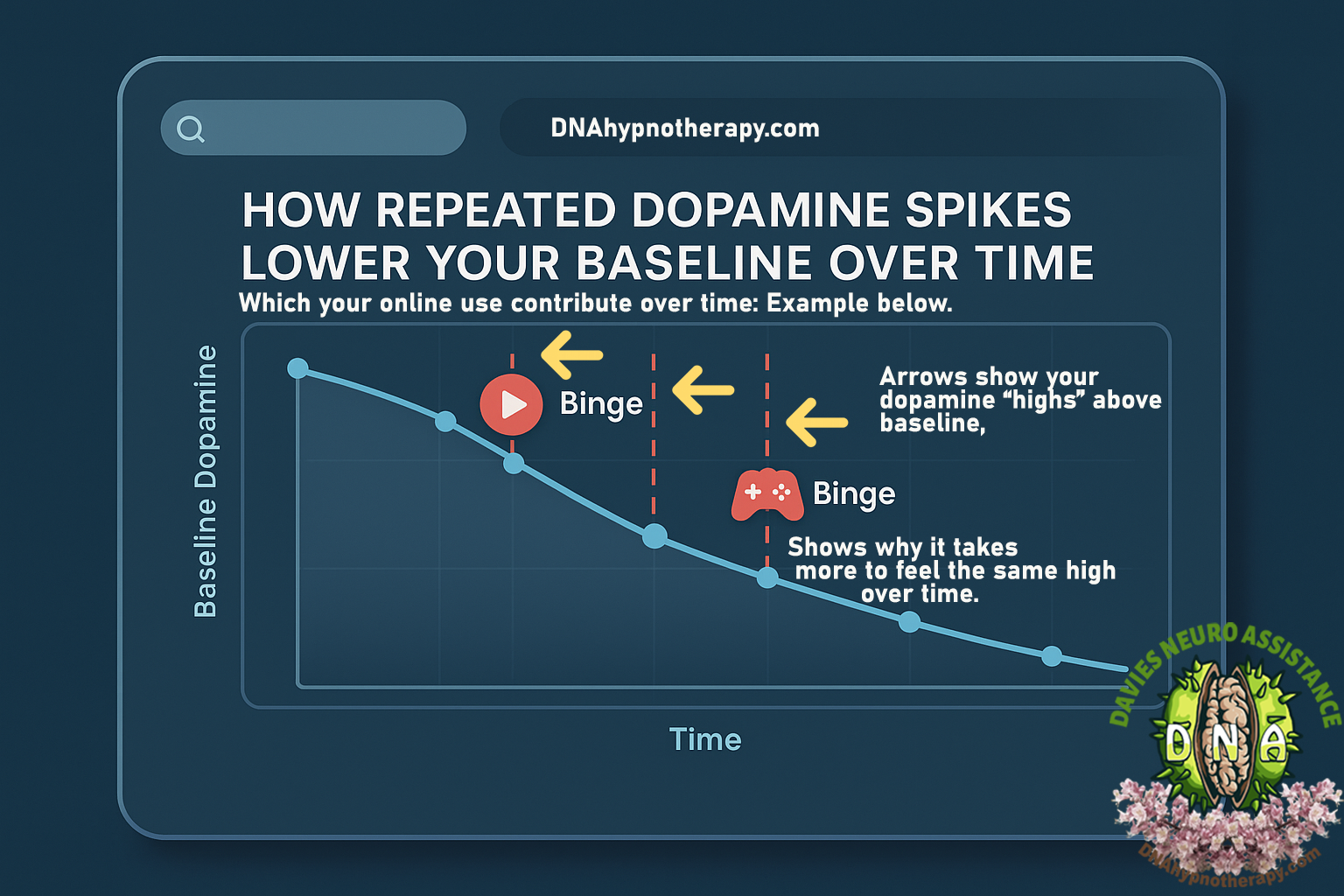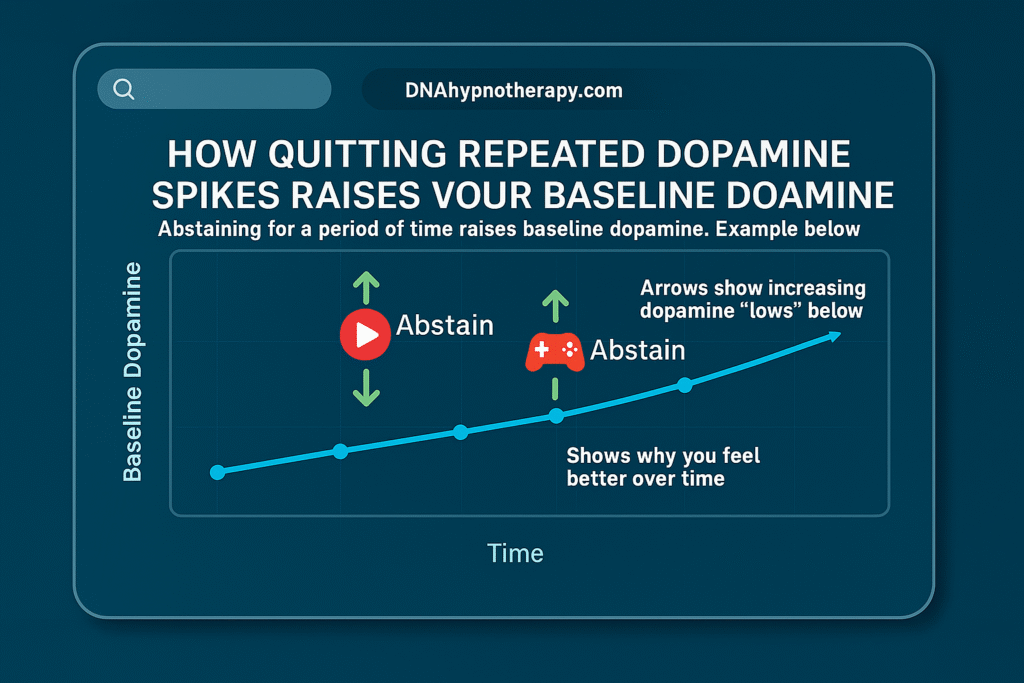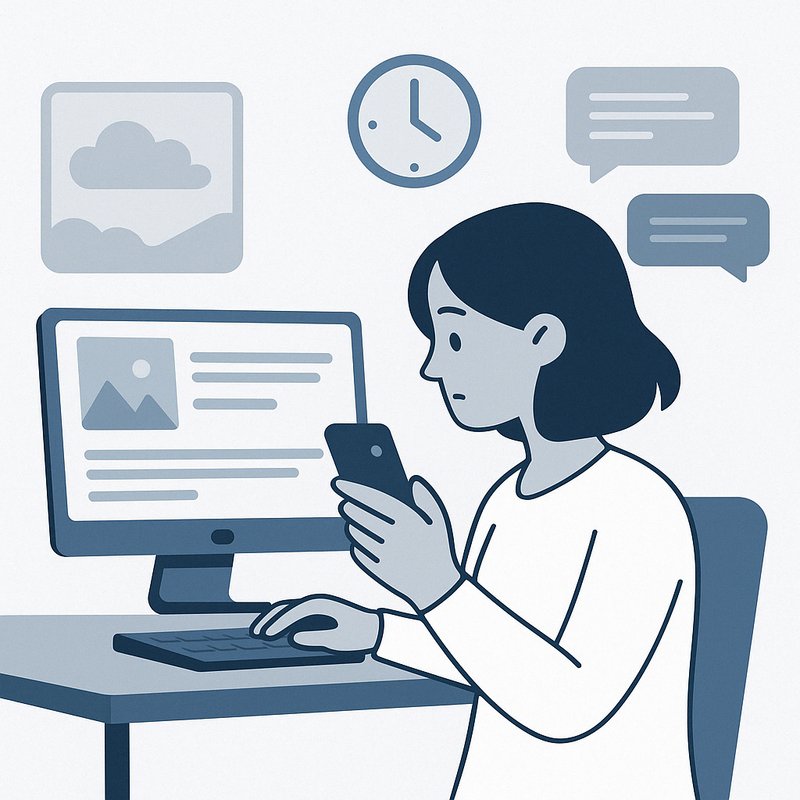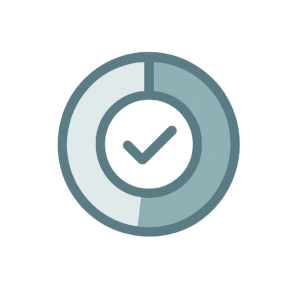About DNA hypnotherapy

About Me
Hi guys my name is and I have been practicing hypnotherapy since February 2023 and have been assosiated with AFSfH and then I have a full Members with the NCH
More about my path
I’ve always been interested in hypnotherapy and even used it in the past to manage a chronic health condition, which brought me real benefits. One day, I came across a 10-month course led by expert teachers Charlotte Spillane and Cathy Eland. I applied straight away, and the rest is history.
Since graduating, I’ve focused mainly on digital addiction. It’s an issue that’s becoming more common across all age groups, and I’ve dedicated my work to helping people understand and break free from these habits.
So, what led me to focus specifically on digital habits? It all started when I stumbled upon a Facebook post, one of those rare times the algorithm actually showed me something useful. The article was about how out of control our relationship with digital technology has become. I started to notice it everywhere. People constantly glued to their phones, unaware of how damaging it can be. We are like guinea pigs in a giant digital experiment, exposed to nonstop stimulation, dopamine hits, and instant gratification. It becomes addictive and often escalates into even more intense forms of digital engagement.
What I’ve come to understand is that this behavior is often a form of escapism. It can stem from boredom, loneliness, or emotional discomfort. The article made me realize how little regulation there is in this space. Algorithms are designed to keep you engaged. They do not just know your preferences, they know your vulnerabilities. Before you know it, you are installing new games, scrolling endlessly, or consuming content that feeds your impulses. You start spending money on things you never planned to, getting lost in digital habits that affect your self-esteem, motivation, and daily functioning.
And then it becomes a secret life. Talking about it with friends or family can feel shameful. Even opening up to a therapist may feel overwhelming. The shame can be a barrier to getting help. That article struck a chord with me, and combining it with my background in technology, I saw just how powerful and dangerous these algorithms can be. They pull you in, and before you realize it, hours have passed and the damage is done.
What inspired me most about the article was its message of hope. It suggested that digital consumption could change and that the future might see more people embracing digital detox. It made a powerful comparison. While we are careful about what we put in our bodies, we often forget that what we consume through our eyes and attention affects us just as deeply. It can be hypnotic. The good news is that recovery is absolutely possible. If you are reading this now, you are already in a strong position because motivation is more than half the battle.
You might be wondering just how serious your own digital habits are. If so, I suggest you take my free test to reflect on your digital behavior. Based on your results, you can decide what steps feel right for you. And if the test shows there is a real problem, we can talk about what kind of action you are ready to take.
Is Your Screen Taking Over Your Mind, Time, or Self-Control?
Take our free Digital-Habits Self-Assessment to find out.
This simple quiz asks about real-life patterns — like how often you lose track of time online, impulsively check your phone, or feel restless without screen time.
Each question lets you rate yourself from “Never” to “All the time.”
When you finish, you’ll instantly see your results in a clear visual chart, showing whether your habits are in a low, moderate, or high-risk zone.
It only takes a few minutes to complete and can give you a powerful insight into your digital habits and what steps might help you regain focus and control.
What We Help With
Not Sure How Deep It’s Gotten?
Take a quick self-assessment to find out where you are in the loop—and what kind of support might help most.
Not all habits are the same, and not all fixes are the same either.
If your habit isn’t totally in control yet, one or two sessions might be all you need to reset things. That could be enough to regain your footing and stop the loop before it goes any deeper.
But if it’s more complex—if it’s been running your life—then we need to go deeper:
• If you’re experiencing anxiety or depression alongside it
• If it’s chipped away at your self-esteem
• If your relationships are suffering
• If it’s draining your money and leaving you stressed
• If you’re living that secret life and it’s weighing you down
• If you feel like you’re wasting your time, energy, and mental health
Then this is more than just a habit. It’s a pattern that’s taken root. In that case, you might need five, six, or even more sessions. And that’s okay.
The good news is you’re not starting from scratch. You’re already halfway there just by facing it.
Digital addiction is different from most habits because you’re surrounded by things designed to pull you back in. Imagine walking through a field full of hidden holes. You spot one and step around it, but the next one’s covered in grass. The next one’s deeper. Some are baited—TV ads promoting gambling, billboards showing “perfect” people that trigger porn habits, and the algorithm itself keeping you watching, tapping, spending.
Even so, your mind can overcome this.
The rational, clear-thinking part of you still knows what’s best. It hasn’t gone anywhere. When we work with that part of your mind, that’s when real, lasting change happens.
Why You Keep Needing Bigger Hits for the Same Feeling
This chart shows how repeated dopamine “highs” from binge sessions gradually lower your brain’s baseline over time — and why it takes more just to feel normal.

What This Graph Shows and How You Ended Up Here
This image shows how repeated online stimulation like binge watching videos, endless scrolling or late-night gaming creates quick dopamine spikes but over time drags your brain’s natural baseline down.
At first it feels harmless. You open an app, play a game or see a notification and get a little buzz. Each time you chase that buzz your brain lowers its baseline to keep balance. Over weeks and months this leads to:
- Shorter attention spans
- Low motivation for ordinary tasks
- Mood dips when you’re not stimulated
- Feeling flat, restless or bored in everyday life
Every binge on the graph gives you a burst of dopamine above baseline but afterward your baseline slips down a little more. That explains why each hit takes more effort and why simple activities like walking, reading or having a real conversation start to feel dull.
You haven’t failed or broken your brain. It adapted to constant high intensity reward. With solution focused hypnotherapy you can reset those patterns, calm compulsive urges and rebuild motivation so your baseline can climb back up.

What This Graph Shows and How Solution Focused Hypnotherapy Supports It
The rising line on this graph represents dopamine baseline recovery, a return to feeling motivated, focused and emotionally balanced without needing constant digital stimulation.
When you stop chasing quick dopamine spikes from scrolling, gaming or adult content the brain can start to reset. Early on it often feels flat or even depressing and that is where Solution Focused Hypnotherapy makes a difference.
-
Focus on What’s Working
We help you build on the positive not dig into the past. By identifying small wins, strengths and future goals you begin to retrain your brain to respond to natural reward systems. -
Calm the Fight or Flight System
Overstimulation keeps your brain stuck in survival mode. Hypnosis sessions activate the parasympathetic nervous system allowing your mind and body to shift into recovery. -
Strengthen Natural Dopamine Triggers
We guide your mind to reconnect with genuine sources of satisfaction like achievement, progress and connection instead of relying on artificial highs. -
Create Lasting Change
Through repetition and reinforcement we support new habits that lead to long term improvement in baseline dopamine and emotional resilience.
That upward curve? It is not just possible it is measurable. With the right support it can become your new normal.
Get your free phone discovery call
Is Your Screen Taking Over Your Mind, Time, or Self-Control?
You tell yourself, “Just one more scroll. One more video. One more minute.”
But suddenly it’s 2am again. You’ve lost hours. Your motivation is gone. You’re distracted, foggy, frustrated — and maybe even hiding it from the people around you.
Sometimes it starts with social media. Other times, it’s opening a browser, clicking into content you didn’t plan to — again. It happens on your phone, your tablet, your laptop, or behind a desktop PC. Wherever it starts, the outcome’s the same: that familiar cycle of chasing stimulation… and regretting it afterward.
You’ve tried to stop. Promised yourself this is the last time.
But the urge comes back. And here you are.
If that hits home — this is for you.
This Affects More People Than You Might Expect
This isn’t just a phase, a weakness, or something to “snap out of.” And it’s not just you.
I work with people from all backgrounds — professionals, students, creatives, entrepreneurs — people who are driven, intelligent, and outwardly doing fine… yet privately caught in digital habits they can’t seem to control.
Whether it’s on your phone during quiet moments, on a desktop PC behind closed doors, or late at night on a tablet — it can start to feel like a second life. A hidden one. One that’s eating away at your time, focus, confidence, and peace of mind.
It’s more common than you think. And it can affect anyone — regardless of age or gender — especially in a world designed to keep us chasing the next click, swipe, or fix.
What matters now isn’t how long you’ve been stuck.
It’s that you’re ready to take back your attention, your energy, and your sense of control.
The Hidden Cost of Compulsive Online Habits
Whether it’s doomscrolling on apps, clicking through intense or explicit content in your browser, or gaming late into the night — these habits take a real toll:
- Low energy, brain fog, and poor focus
- Guilt, anxiety, or emotional flatness
- Poor sleep and difficulty concentrating
- Loss of confidence and self-discipline
- Avoidance of responsibilities, social life, or intimacy
- Spending money you later regret — on games, exclusive content, or private platforms
- Losing motivation for your goals, fitness, creativity, or relationships
And the most valuable thing you’re losing? Time.
Your time is your real currency — and you never get it back.
Every hour spent chasing digital highs is an hour you could have spent building something real — in your body, your mind, your relationships, or your future.
These platforms are designed to exploit that.
From social media to adult content to outrage-driven news, the algorithm doesn’t care how you feel — only that you keep watching, scrolling, clicking. The longer you stay, the more they profit.
But you don’t have to keep feeding that system.
You can learn to interrupt it — and use your time for something far more meaningful.
What Changes When You Take Back Control
When you begin to shift these patterns, the difference isn’t just internal — people notice.
- You feel mentally sharper and emotionally calmer
- You sleep better and wake up feeling more alive
- You stop procrastinating and start making real progress
- You show up more in your relationships — and they feel deeper
- You feel proud of your choices — and others see the change in you
- Comments like: “You seem different lately — more focused.” “You’ve got something back.”
This isn’t about becoming someone else.
It’s about getting back in touch with the version of you who’s been buried under the noise.
How Solution-Focused Hypnotherapy Can Help
I use a modern, forward-thinking form of clinical hypnotherapy that works with your subconscious mind — the part responsible for habits, impulses, and emotional patterns.
You don’t have to go into painful backstories or explain every detail. We’ll focus on what’s working, what you want to change, and how to help your mind get back on your side.
- Break subconscious behavioural loops
- Build emotional control and mental clarity
- Reduce cravings and digital compulsions
- Reconnect with focus, confidence, and intention
- Create change that actually lasts
You’ll learn to manage urges, rewire reward-seeking patterns, and feel like you’re in charge again.
About Me
I’m a fully qualified clinical hypnotherapist, registered with the National Council for Hypnotherapy (NCH) and the Association for Solution-Focused Hypnotherapy (AfSFH).
My work is confidential, discreet, and 100% online — designed to meet you where you are, without judgment.
I specialise in helping people overcome online and behavioural addictions so they can live with clarity, freedom, and purpose.
Let’s Talk — No Pressure, Just a Real Conversation
If you’re tired of the loop and ready to feel calm, focused, and in control again — let’s talk.
👉 Book your free 20-minute discovery call
👉 Download your free calming sleep MP3
You can also message me directly through the Messenger chat option on the website if you have a question before booking.
Your reset starts now — and I’m here to walk it with you.
🧠 Reboot Your Mind. Reclaim Control.
Is Your Screen Taking Over Your Mind, Time, or Self-Control?
You tell yourself, “Just one more scroll. One more video. One more minute.”
But suddenly it’s 2am again. You’ve lost hours. Your motivation is gone.
This Affects More People Than You Might Expect
This isn’t just a phase, a weakness, or something to “snap out of.” And it’s not just you.
I work with people from all backgrounds — professionals, students, creatives, entrepreneurs — people who are driven, intelligent, and outwardly doing fine… yet privately caught in digital habits they can’t seem to control.
Whether it’s on your phone during quiet moments, on a desktop PC behind closed doors, or late at night on a tablet — it can start to feel like a second life. A hidden one. One that’s eating away at your time, focus, confidence, and peace of mind.
It’s more common than you think. And it can affect anyone — regardless of age or gender — especially in a world designed to keep us chasing the next click, swipe, or fix.
Wondering if your screen time is crossing a line?
Take our quick self-assessment and find out where you stand — no pressure, no judgment.









